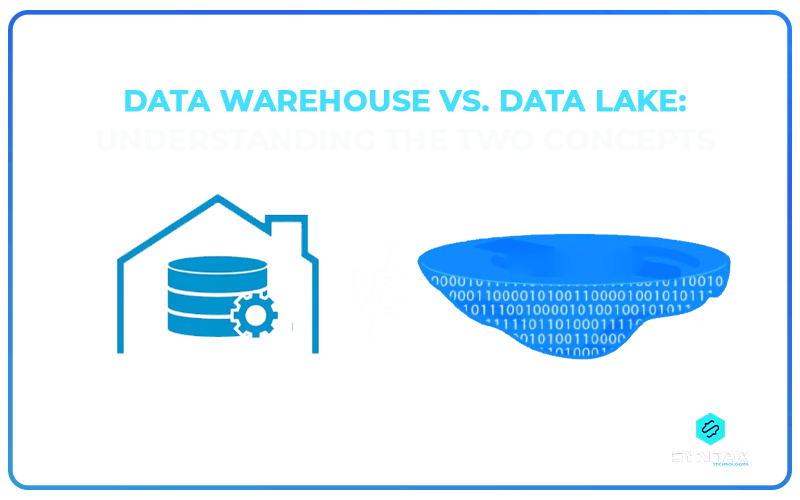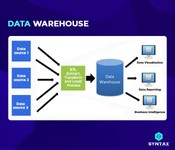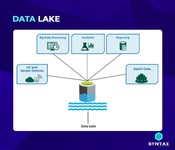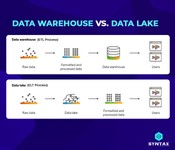We are Entering a New World in which Data may be More Important than Software – Tim O? Reilly
The above mentioned quote hints at what the future is all about. The rising significance of Data with passing time is clearly noticeable.
While there is no dearth of Data and a staggering mass of it is generated on a daily basis across the world; much of it would make no sense, unless there do exist a proper mechanism in place for managing and storing it.
This leads us to the notions of Data Warehouse and Data Lake. However, given the confusion which surrounds the two terms, it is important to understand what is Data Lake vs. Data Warehouse.
Moreover, the question of Data Warehouse vs. Data Lake is an important consideration in terms of understanding the best possible means for managing Big Data at your disposal.
In this blog, we shall seek to understand the two concepts of Data Lake and Data Warehouse in detail, with particular emphasis on the issue of Data Lake vs. Data Warehouse. We shall elaborate on what is Data Lake vs. Data Warehouse in their individual capacity, along with understanding the benefits of each. Consequently, we shall undertake a comparative analysis on the issue of Data Lake vs. Warehouse.
What is Data Warehouse?
The presence of the word ?warehouse? will to a large extent help you in understanding the notion of a Data Warehouse.
Within an actual warehouse, after the processing of contents, they are segregated and organized onto shelves and sections. A Data Warehouse too, can be understood as a repository where integrated data stored comes from diverse sources.
The data present in a Data Warehouse is highly structured and unified and is appropriate for extracting meaningful business insights.
One can think of it as a collection of ready to use data for supporting historical analysis and informing business decision making.
So what are some of the properties of features of a Data Warehouse? These are:
- Highly structured
- Highly transformed
- It follows a definite methodology
- Neatly organized and segregated by subject area
- Data is only loaded onto warehouse when its objective and use has been explicitly defined
Benefits of Data Warehouse
- Contributes towards the processes of Data Analytics and Business Intelligence
- After the processes of Data Cleaning and Processing, it is considered to be completely conducive for deriving valuable insights
- Data Warehouse represents complete accurate data which helps business convert information into insights
- There is little to no data preparation required
What is Data Lake?
The term ?Data Lake? was coined by Pentaho CTO James Dixon. You can visualize a Data Lake as a water body in its original state – natural, adulterated and polluted.
Thus, a Data Lake is essentially a repository which stores all kinds of data- structured, unstructured or semi-structured. It is one of the storage houses where data is stored in its original format with no limitation on account size.
Thus, it is evident that a Data Lake provides a vast amount of data which can be used for building data pipelines, for native integration and increased analytical performance.
So what are some of the properties of features of a Data Lake? These are:
- It is a container which accepts all kinds of data from different sources. It does not block any of it
- At the leaf level, data is stored in an untransformed state
- In order to conduct analysis, data is gradually transformed and schema is applied
Benefits of Data Lake
- Since Data Lake acts as a repository for all kinds of data (structured or unstructured), it provides a far broader range of data, as compared to a Data Warehouse
- Since data is available in the raw state in a Data Lake, it is available for use far faster
- It provides a cost effective solution for data storage of staggering masses of structured as well as unstructured data like call logs, ERP transactions and so on
- The wide range of data available provides the chance of analyzing it in newer ways and thus deriving unexpected insights
Data Warehouse vs. Data Lake: Key Differences
In this section we shall undertake a detailed comparison while discussing the issue of Data Lake vs. Warehouse.
Data Lake vs. Data Warehouse: Raw Data vs. Processed Data
Raw Data is the form in which data exists before it is has been processed or transformed. While discussing the issue of Data Warehouse vs. Data Lake, the difference in the nature of data is an important point of consideration.
While Data Warehouse is essentially used to store processed, structured and refined data; Data Lake is essentially used to store unprocessed, unstructured and unrefined data.
These raw data generally includes PDF files, chat logs, images and so on. Since the Data Lakes act as repository for these raw data, the main sources of this data are generally user data, IoT devices, web application transactions, real time social media streams.
Structured data, on the other hand, is data which has been cleaned to fit a schema and has been organized into tables.
Data Lake vs. Warehouse: Users
Since Data Lakes consists of unprocessed data, it is difficult to be handled by those, not proficient in data management capabilities.
Thus, the main users of data in a Data Lake are Data Scientists and Data Engineers who use specialized tools for extracting meaningful information from data, while Data Engineers maintain Data Lakes, along with integrating them into data pipelines.
The main users for data in Data Warehouses are Data Analysts and Business Analysts. They rely on highly processed data for their analytical purpose and given their level of expertise, Data Warehouses which entail low level of programming, are suitable for them.
Data Warehouse vs. Data Lake: Difference in Purpose of Use
Data Lake serves as a cost-effective storage option for storing massive amounts of data coming from diverse sources. As the data is flexible and easily scalable, it is not required to fit a specific schema and this helps in reducing cost.
Moreover, the objective to which the data will be put to use is not pre-determined in case of the Data Lake. The flow of data into the Data Lake is not controlled with a specific purpose in mind. It might or might not be used in future.
In contrast, Data Warehouse serves as an effective medium for analyzing historical data as structured data is clean, with a uniform schema which renders them easier for analysis.
Thus, processed data inside a Data Warehouse is essentially data which have been put to definite specific uses by the organization.
Data Lake vs. Data Warehouse: Tabular Comparison
Having elaborated in detail on the differences between a Data Warehouse and a Data Lake in the section above; here we shall undertake a synoptic comparison on the issue of Data Lake vs. Warehouse.
Conclusion
The importance of the issue of Data Warehouse vs. Data Lake is largely a theoretical analysis of the difference in structure, agility and processes of the two models. It is not necessarily a verdict on which model is superior. The choice of the model will depend on the needs and objectives of your organization. In fact, most organizations need both. While Data Warehouses fulfills the analytical needs of business users; Data Lakes offer the much needed flexibility and predictive capability which comes from raw unstructured data, along with granular structured ones. Thus, the topic of Data Lake vs. Data Warehouse is essentially an analysis of the business scenario which is best suitable for the adoption of a particular model.
Developing a good understanding of the two models is integral to the overall process of Data Management, Data Analytics as well as Business Intelligence. Two of the flourishing domains of the tech industry, Data Analytics and Business Intelligence, is all set to determine of the present and future of other industrial sectors as well. We, at Syntax Technologies, provide you with top-notched training in Data Analytics as well as Business Intelligence. Enroll now for our Data Analytics and Business Intelligence course.




